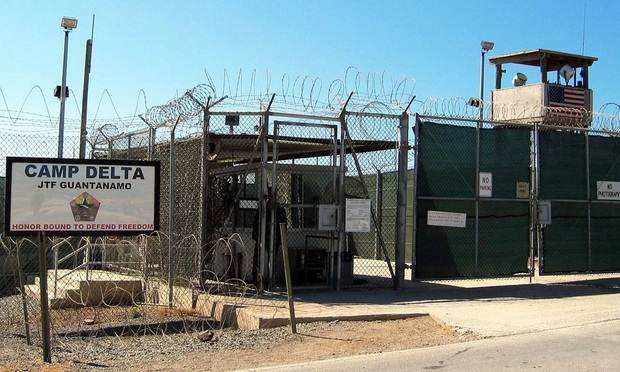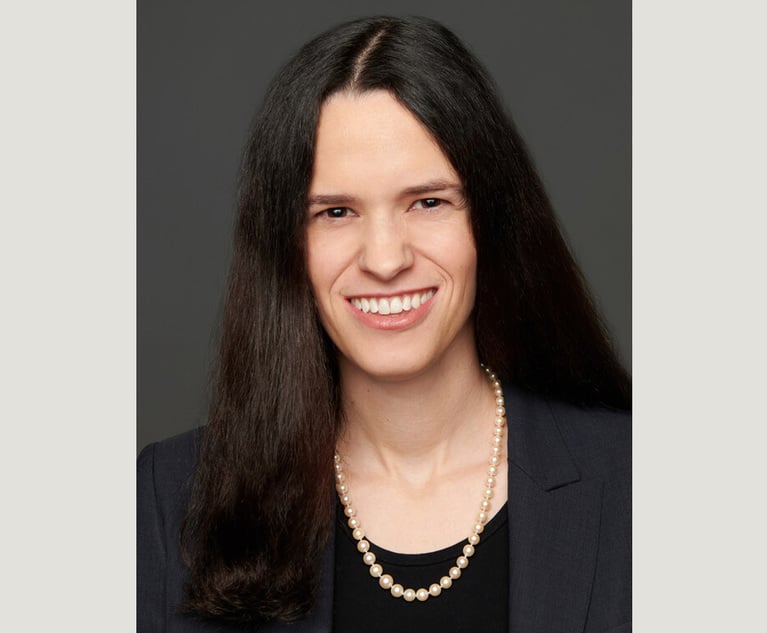Ninth Circuit Finds 'Uncomfortable Facts' Are Not State Secrets in CIA Torture Ruling
A panel for the U.S. Court of Appeals for the Ninth Circuit found that the district court did not do enough to separate privileged information from sensitive facts that could be embarrassing to the government.
September 18, 2019 at 07:52 PM
5 minute read
 Camp Delta is a permanent American detainment camp at Guantanamo Bay, Cuba.
Camp Delta is a permanent American detainment camp at Guantanamo Bay, Cuba.
A divided appeals court reversed an order quashing a Guantanamo Bay detainee's subpoena for details of his treatment while held at a Central Intelligence Agency black site in Poland for use in a foreign investigation into his alleged torture.
A panel for the U.S. Court of Appeals for the Ninth Circuit ruled that a district court wrongfully dismissed the detainee's request for a subpoena without taking the time to parse aspects of the discovery that were not deemed state secrets but could result in public outcry.
"While it is essential to guard the courts from becoming conduits for undermining the executive branch's control over information related to national security, these concerns do not apply when the alleged state secret is no secret at all, but rather a matter that is sensitive or embarrassing to the government," wrote Judge Richard Paez of the U.S. Court of Appeals for the Ninth Circuit, joined by U.S. District Judge Dean Pregerson of the Central District of California, sitting by designation.
In 2002, the CIA arranged for the capture of Zayn Al-Abidin Muhammad Husayn, known as Abu Zubaydah, in Pakistan. On belief that Zubaydah was a high-ranking member of Al-Qa'ida, the CIA formally detained him as part of its "enhanced interrogation" program emerging from the 9/11 terrorist attacks. In the first four years of detention, Zubaydah was transferred to several CIA black sites, including one in Poland, where Zubaydah contends he was subject to advanced torture techniques that resulted in the loss of his left eye and brain damage. The Senate Select Committee on Intelligence released a report in 2014 that found Zubaydah was not a high-ranking member of the terror group after all, and Zubaydah is now held at Guantanamo Bay Naval Base in Cuba.
In 2015, the European Court on Human Rights found that Abu Zubaydah was indeed held at a Polish CIA site from December 2002 to September 2003, and torture techniques developed by independent CIA contractors James Elmer Mitchell and John Jessen were used on him. These methods include the use of insects, simulating burying detainees alive and persistent waterboarding, to the point where his diet was restricted to limit vomiting during torture.
After the ECHR ruled that Poland did not sufficiently investigate human rights violations against Zubaydah at the black site, the country reopened an investigation into Polish officials' involvement in his detention. The U.S. denied Poland's request for evidence, which forced Zubaydah and his lawyer, Joe Margulies, professor of law and government at Cornell University, to subpoena Mitchell and Jessen for the probe in Poland.
When the U.S. District Court for the Eastern District of Washington granted the subpoena, the Department of Justice intervened and claimed state secret privilege, citing two declarations from then-CIA Director Mike Pompeo.
The declarations argue that Zubaydah's discovery requests "would tend to confirm or deny whether or not [Mitchell and Jessen] have information about these categories as they pertain to whether or not the CIA conducted detention and interrogation operations in Poland and/or with the assistance of the Polish Government."
The district court quashed the subpoena, agreeing with Pompeo that disclosing this information could jeopardize national security by compromising the trust of foreign governments, limiting the CIA's effectiveness in counterterrorism operations and could spur backlash from other countries.
Although the Ninth Circuit agreed that most of the information in the discovery would be state secrets, the court emphasized the need to strike "an appropriate balance … between protecting national security matters and preserving an open court system."
"In other words, the rationale behind the state secrets privilege is to protect legitimate government interests, not to shield the government from uncomfortable facts that may be disclosed or discussed in litigation," Paez wrote. "Protecting the former is an unfortunate necessity in our complicated world of national and international affairs. Protecting the latter is inconsistent with the principle of an independent judiciary."
For instance, the public has known for several years about a U.S. detention facility in Poland and the torture techniques used on Zubaydah and other detainees there, the court wrote, finding that "the district court erred in quashing the subpoenas in toto rather than attempting to disentangle nonprivileged from privileged information."
However, Judge Ronald Gould of the U.S. Court of Appeals for the Ninth Circuit said in his dissent that the majority endangered national security by asking the district court to separate secret information from public information.
"In this case, I would defer to the view of then-CIA Director and now Secretary of State Michael Pompeo that the disclosure of secret information in this proceeding reasonably could be expected to cause serious, and in many instances, exceptionally grave damage to U.S. national security," Gould wrote.
On appeal, Zubaydah was represented by Jerry Moberg of Jerry Moberg & Associates in Ephrata, Washington, as well as David Klein and John Chamberlain of Pillsbury Winthrop Shaw Pittman in Washington, D.C. Klein directed comments to Margulies.
"No country can hide its bloodstains forever, and today's decision was the first step in a long process of coming clean," Margulies said. "We have not yet learned the whole truth about the torture scandal, but this is a beginning. We are also grateful that the panel recognized both that Abu Zubaydah had no connection to al-Qaeda, and that he was not merely subjected to an 'enhanced' interrogation. He was tortured."
Thomas Byron III, a law professor at Georgetown University, who argued on behalf of the U.S. government did not respond to a request for comment at the time of publication. A DOJ representative said the agency was reviewing the ruling.
This content has been archived. It is available through our partners, LexisNexis® and Bloomberg Law.
To view this content, please continue to their sites.
Not a Lexis Subscriber?
Subscribe Now
Not a Bloomberg Law Subscriber?
Subscribe Now
NOT FOR REPRINT
© 2025 ALM Global, LLC, All Rights Reserved. Request academic re-use from www.copyright.com. All other uses, submit a request to [email protected]. For more information visit Asset & Logo Licensing.
You Might Like
View All
In-House Moves of the Month: Boeing Loses Another Lawyer, HubSpot Legal Chief Out After 2 Years
5 minute read
Mike Lynch's Brush With Prison Taught Him Life Is Precious. Then a Yacht Accident Proved Him Right

Facing a Shrinking Talent Pool, Insurance Defense Firms Are Fighting to Add Attorneys
6 minute read
AG Garland Calls Prosecuting Execs 'Greatest Deterrent' to Corporate Fraud
Trending Stories
- 1Bribery Case Against Former Lt. Gov. Brian Benjamin Is Dropped
- 2‘Extremely Disturbing’: AI Firms Face Class Action by ‘Taskers’ Exposed to Traumatic Content
- 3State Appeals Court Revives BraunHagey Lawsuit Alleging $4.2M Unlawful Wire to China
- 4Invoking Trump, AG Bonta Reminds Lawyers of Duties to Noncitizens in Plea Dealing
- 522-Count Indictment Is Just the Start of SCOTUSBlog Atty's Legal Problems, Experts Say
Who Got The Work
J. Brugh Lower of Gibbons has entered an appearance for industrial equipment supplier Devco Corporation in a pending trademark infringement lawsuit. The suit, accusing the defendant of selling knock-off Graco products, was filed Dec. 18 in New Jersey District Court by Rivkin Radler on behalf of Graco Inc. and Graco Minnesota. The case, assigned to U.S. District Judge Zahid N. Quraishi, is 3:24-cv-11294, Graco Inc. et al v. Devco Corporation.
Who Got The Work
Rebecca Maller-Stein and Kent A. Yalowitz of Arnold & Porter Kaye Scholer have entered their appearances for Hanaco Venture Capital and its executives, Lior Prosor and David Frankel, in a pending securities lawsuit. The action, filed on Dec. 24 in New York Southern District Court by Zell, Aron & Co. on behalf of Goldeneye Advisors, accuses the defendants of negligently and fraudulently managing the plaintiff's $1 million investment. The case, assigned to U.S. District Judge Vernon S. Broderick, is 1:24-cv-09918, Goldeneye Advisors, LLC v. Hanaco Venture Capital, Ltd. et al.
Who Got The Work
Attorneys from A&O Shearman has stepped in as defense counsel for Toronto-Dominion Bank and other defendants in a pending securities class action. The suit, filed Dec. 11 in New York Southern District Court by Bleichmar Fonti & Auld, accuses the defendants of concealing the bank's 'pervasive' deficiencies in regards to its compliance with the Bank Secrecy Act and the quality of its anti-money laundering controls. The case, assigned to U.S. District Judge Arun Subramanian, is 1:24-cv-09445, Gonzalez v. The Toronto-Dominion Bank et al.
Who Got The Work
Crown Castle International, a Pennsylvania company providing shared communications infrastructure, has turned to Luke D. Wolf of Gordon Rees Scully Mansukhani to fend off a pending breach-of-contract lawsuit. The court action, filed Nov. 25 in Michigan Eastern District Court by Hooper Hathaway PC on behalf of The Town Residences LLC, accuses Crown Castle of failing to transfer approximately $30,000 in utility payments from T-Mobile in breach of a roof-top lease and assignment agreement. The case, assigned to U.S. District Judge Susan K. Declercq, is 2:24-cv-13131, The Town Residences LLC v. T-Mobile US, Inc. et al.
Who Got The Work
Wilfred P. Coronato and Daniel M. Schwartz of McCarter & English have stepped in as defense counsel to Electrolux Home Products Inc. in a pending product liability lawsuit. The court action, filed Nov. 26 in New York Eastern District Court by Poulos Lopiccolo PC and Nagel Rice LLP on behalf of David Stern, alleges that the defendant's refrigerators’ drawers and shelving repeatedly break and fall apart within months after purchase. The case, assigned to U.S. District Judge Joan M. Azrack, is 2:24-cv-08204, Stern v. Electrolux Home Products, Inc.
Featured Firms
Law Offices of Gary Martin Hays & Associates, P.C.
(470) 294-1674
Law Offices of Mark E. Salomone
(857) 444-6468
Smith & Hassler
(713) 739-1250






